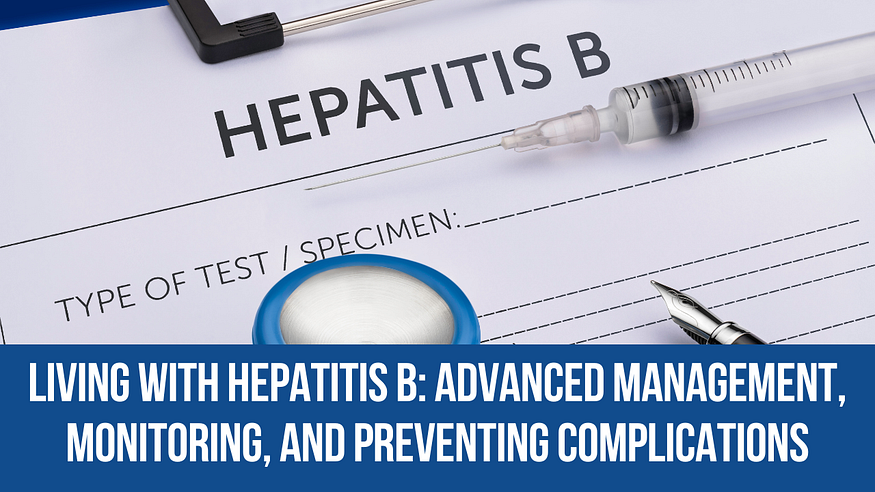Living with Hepatitis B: Advanced Management, Monitoring, and Preventing Complications

Introduction: Why Expert Liver Care Matters in Hepatitis B
Hepatitis B is one of the most widespread yet misunderstood liver infections. Many patients remain symptom-free until the disease progresses to complications like cirrhosis, fatty liver disease symptoms, or even liver cancer.
This is why seeing a specialist is crucial. A general doctor may detect Hepatitis B, but only a hepatologist in Chandigarh like Dr. Sandeep Pal can provide advanced management, continuous monitoring, and strategies to prevent long-term complications.
What Is Hepatitis B?
Hepatitis B is a viral infection that attacks the liver, causing inflammation and potential long-term scarring. It may resolve on its own or become chronic.
Types of Hepatitis B
- Acute Hepatitis B — A short-term illness that lasts less than 6 months; many recover completely.
- Chronic Hepatitis B — A long-term infection where the virus remains in the body, often requiring lifelong management.
How Is Hepatitis B Spread?
- Direct blood contact (transfusions, unsafe injections, tattoos, piercings)
- Unprotected sexual contact
- Mother-to-child transmission during childbirth
- Sharing razors, toothbrushes, or needles
Symptoms of Hepatitis B
Early Symptoms (Acute)
- Fatigue and body weakness
- Loss of appetite
- Nausea and vomiting
- Lower belly pain and stomach discomfort
- Jaundice (yellow eyes/skin)
Chronic Symptoms
- Long-term fatigue
- Swelling in legs and stomach
- Signs of fat around liver.
- Easy bleeding or bruising
- Persistent abdominal pain
Why Chronic Hepatitis B Is Dangerous
Many patients don’t realize they are infected until late complications appear. Without proper care, Hepatitis B can cause:
- Cirrhosis (scarring of the liver)
- Fatty liver disease (often seen alongside HBV)
- Liver failure
Hepatocellular carcinoma (HCC) — liver cancer
This is why regular monitoring with a hepatologist in Chandigarh is critical.
Diagnosis of Hepatitis B
Blood Tests
- HBsAg (surface antigen): Active infection marker
- Anti-HBs: Immunity from past infection or vaccination
- HBV DNA viral load: Indicates replication activity
Liver Biopsy
A sample of liver tissue to check the extent of inflammation and scarring.
Fibroscan
A quick, non-invasive test to measure liver stiffness (fibrosis). Very useful in both Hepatitis B and fatty liver disease symptoms.
Ultrasound / MRI / CT
Used for ongoing monitoring and early detection of liver cancer.
Treatment for Hepatitis B
1. Antiviral Therapy
- Tenofovir and Entecavir are standard treatments.
- Reduce viral activity and prevent progression.
- May be lifelong depending on viral load and liver status.
2. Regular Monitoring
- Liver function tests every 6–12 months
- Liver cancer surveillance (ultrasound + AFP blood test)
- HBV DNA monitoring for treatment response
3. Lifestyle Management
- Strictly avoid alcohol
- Follow a liver-friendly diet (fresh vegetables, lean proteins, low-fat foods)
- Maintain a healthy weight and manage diabetes if present
4. Vaccination & Prevention
- Hepatitis B vaccine for family members and partners
- Safe sex practices and personal hygiene precautions
Patient Story: Managing Chronic Hepatitis B with Expert Care
A 42-year-old patient, Mrs. Mehta, was diagnosed with Hepatitis B during a routine medical exam. Though she felt healthy, a Fibroscan revealed early fibrosis. Under Dr. Sandeep Pal’s care, she started antiviral therapy and now undergoes regular liver cancer surveillance.
Thanks to specialized follow-up, she continues to live a healthy, normal life. This case highlights the importance of seeing a hepatologist for proactive, long-term management.
How Dr. Sandeep Pal Helps Hepatitis B Patients in Chandigarh
As a trusted hepatologist in Chandigarh and liver specialist, Dr. Sandeep Pal provides:
- Chronic Hepatitis B management with advanced antivirals
- Liver biopsy and Fibroscan for precise staging
- Liver cancer surveillance (HCC detection & monitoring)
- Personalized lifestyle and nutritional counseling
- Family screening and vaccination programs
Preventing Hepatitis B Complications
- Get vaccinated if not immune
- Avoid alcohol completely
- Practice safe sex and avoid blood contact
- Don’t share personal items like razors or syringes
- Control risk factors like obesity, diabetes, and fatty liver
- Visit a hepatologist regularly for monitoring
FAQs About Hepatitis B
1. Can Hepatitis B be completely cured?
There’s no full cure yet, but antivirals control the virus and protect the liver.
2. How often should Hepatitis B patients be monitored?
Every 6–12 months, with liver tests, HBV DNA, and ultrasound for cancer surveillance.
3. Is Hepatitis B contagious?
Yes, through blood, unprotected sex, and mother-to-child transmission.
4. Can Hepatitis B cause fatty liver?
Yes, many patients show overlapping fatty liver disease symptoms.
5. Should Hepatitis B patients avoid alcohol completely?
Absolutely. Even small amounts worsen liver damage.
6. Can Hepatitis B lead to cancer?
Yes, it increases risk of hepatocellular carcinoma (HCC).
7. Is the Hepatitis B vaccine effective?
Yes, over 95% effective in preventing infection if completed as a 3-dose series.
8. Can Hepatitis B patients live a normal life?
Yes, with proper treatment, monitoring, and healthy lifestyle habits.
9. Should family members of Hepatitis B patients be tested?
Yes, they should undergo screening and vaccination if unprotected.
10. Do all Hepatitis B patients need antivirals?
Not always. Treatment is based on viral load, liver enzyme levels, and fibrosis stage.
Conclusion: Living Well with Hepatitis B Under Expert Care
Living with Hepatitis B requires careful monitoring, timely treatment, and preventive strategies to avoid serious complications. With the right support from a hepatologist in Chandigarh like Dr. Sandeep Pal, patients can live long, healthy lives.
👉 Don’t delay if you’ve tested positive for Hepatitis B. Schedule your consultation today for advanced liver care, expert monitoring, and personalized treatment.
.jpg)
Comments
Post a Comment